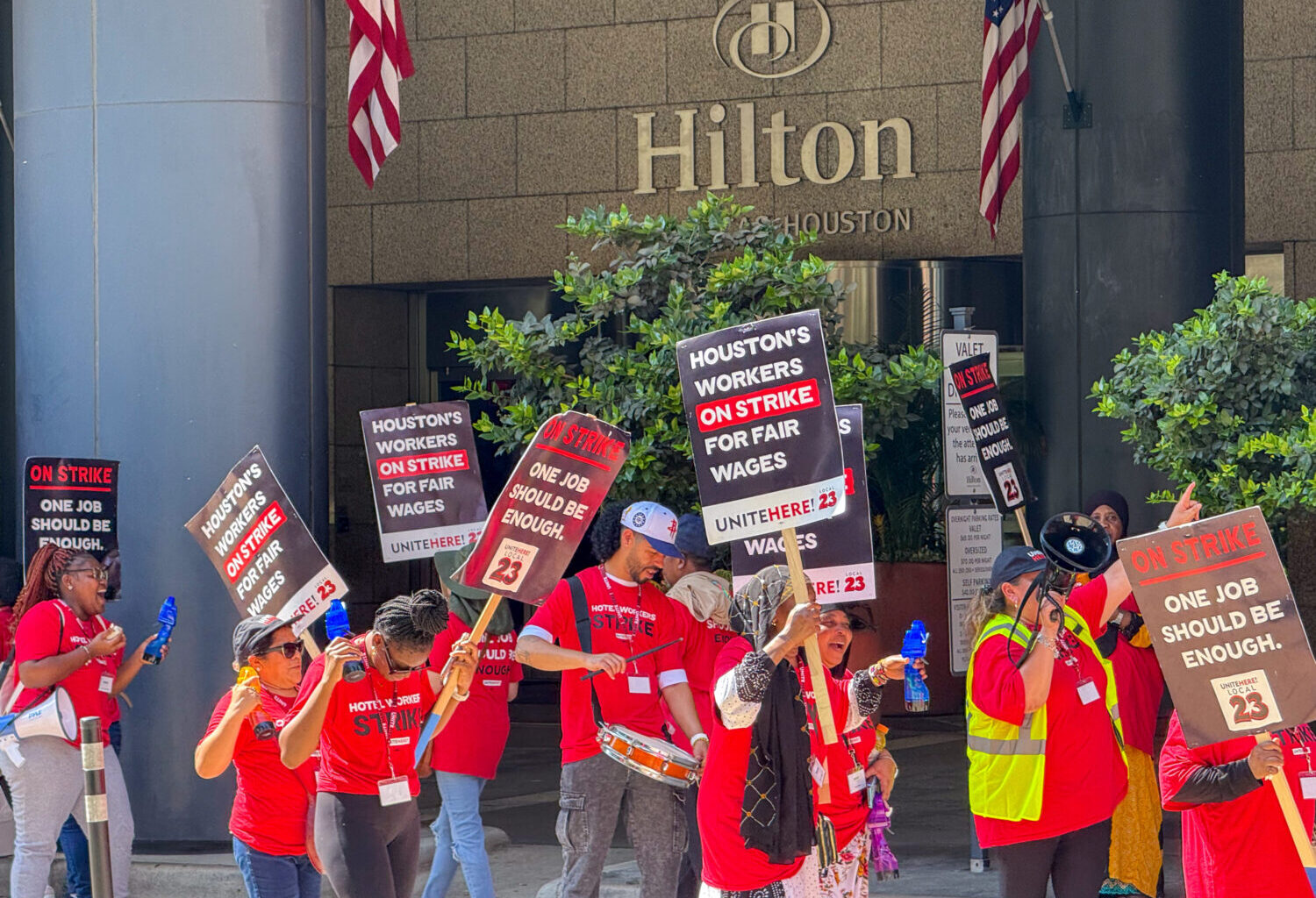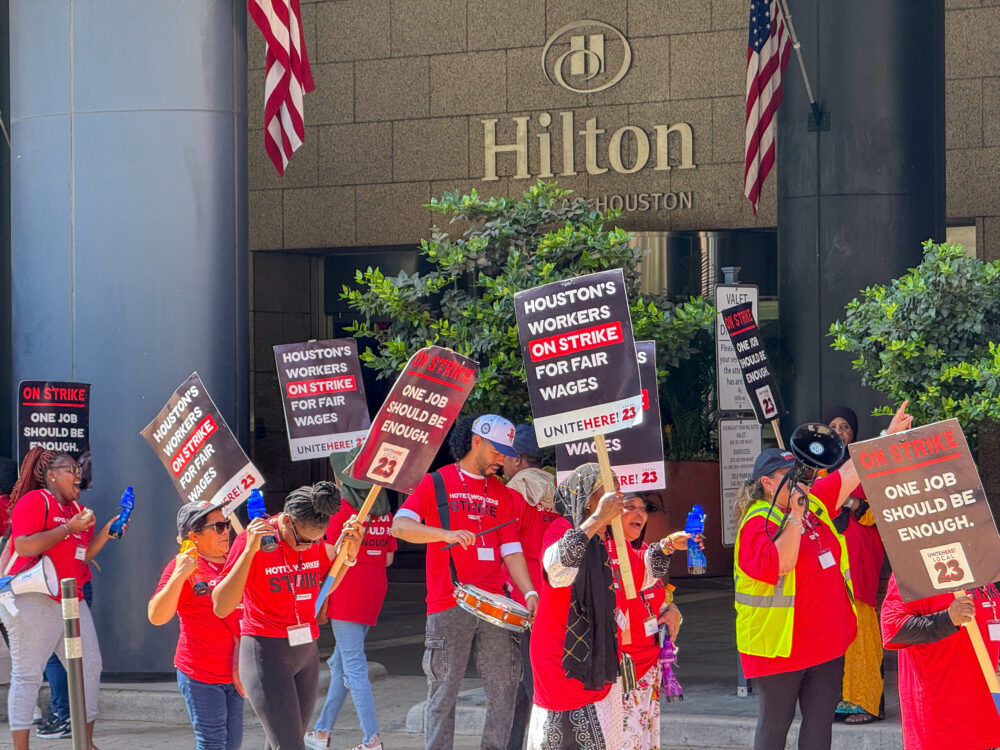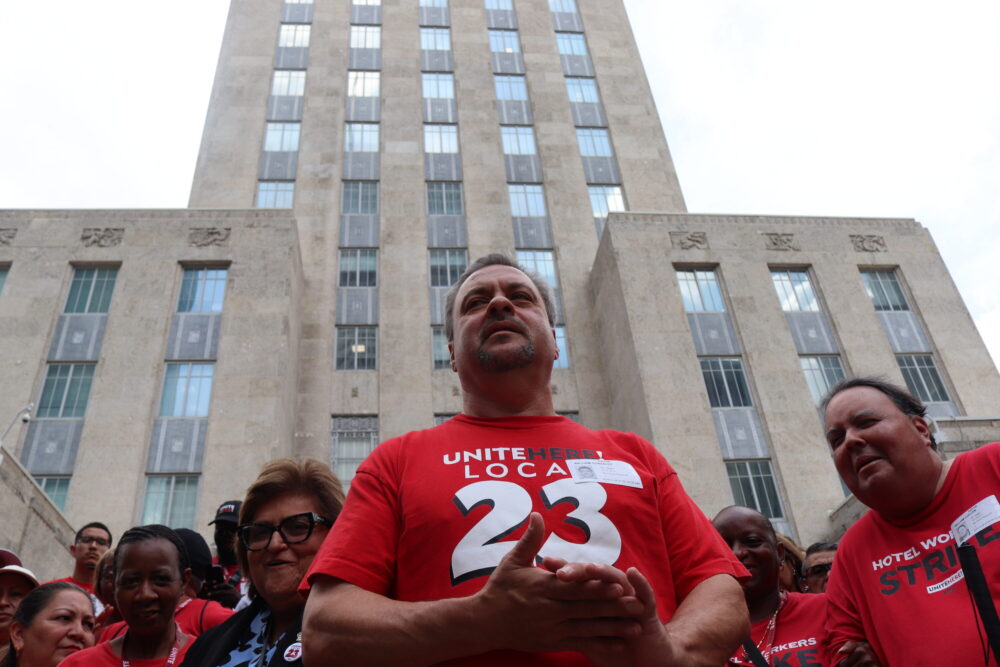Kyle McClenagan/Houston Public Media
UNITE HERE Local 23 union members picket outside of the Hilton Americas-Houston to demand higher wages on Sept. 2, 2025.
Striking workers at the Hilton Americas-Houston last week ramped up criticism of the Houston First Corporation, the city’s local government corporation that owns the hotel, for a perceived lack of transparency.
“Houston First is, in essence, a public organization, and public money flows through them,” said Willy Gonzalez, secretary treasurer and lead negotiator for UNITE HERE Local 23. “Their transactions should be for public review — because it’s not their money, it’s the citizens’ money.”
The union called for a “full audit” of the municipal corporation as workers demand a $23 hourly wage, up from the current base rate of $16.50.
RELATED: Hilton Americas-Houston workers’ strike extended through mid-October as officials postpone events
Houston Public Media reviewed public records and obtained a management agreement between Hilton and Houston First detailing the groups’ fee structure and profits over the past decade. The figures show record-high revenue and profits at the downtown hotel as the hospitality sector recovered from a slump during the COVID-19 pandemic.
Management fees for Hilton
Hilton’s fee structure was revealed in a heavily redacted, 116-page management agreement obtained by Houston Public Media through a public records request.
Under the agreement, Hilton receives two sets of fees — one for managing the hotel, which Hilton pockets as a profit, and the other for reimbursement of corporate services, like payroll processing and advertising. A Houston First spokesperson told Houston Public Media that Hilton received $2.2 million in management fees in 2024, up from $1.87 million in 2023. The services reimbursement fee rose from $1.86 million in 2023 to $2.2 million in 2024.
Amy Gregory, associate professor at the University of Central Florida’s College of Hospitality Management, described the financial structure as “a very common situation.”
Hilton’s fees are tied to a market-level metric known as revenue-per-available-room (RevPAR), which is based on the pricing rates and occupancy levels — a figure that’s likely to continue improving.
“We haven’t quite gotten to the point in every market where rates and RevPAR have surpassed pre-pandemic levels,” Gregory said. “But what we are seeing is that the forecasting for these rates going forward is significantly higher than what it has been in the past.”
Hilton Americas-Houston has rebounded from the pandemic slump. In the first five months of 2025, the hotel’s RevPAR stood at $173 compared to $53 in 2021, according to a Houston First spokesperson. In 2019, the metric was $123.
Aside from the fees to Hilton, Houston First receives all of the hotel’s revenue — meaning only Houston First’s bottom line would be directly affected by higher wages.
Record revenue for Houston First
According to annual financial reports by Houston First, the municipal corporation saw record-high profit from the hotel in 2023 of $67 million. Last year, all-time-high revenue of $119 million was offset by record expenses of $62 million, driven by capital improvement projects, for a profit of about $57 million.
Houston First called 2024 “a standout year for Houston hotels, with exceptional growth across key performance indicators.” In November, Hilton General Manager Jacques D’Rovencourt told a Houston First committee that 2025 would “be another record revenue year.”
“That means that Houston and Houston First are doing their job to bring more business and economic vitality to the city of Houston,” said Houston City Council member Abbie Kamin, who chairs the council’s labor committee. “That being said, if we are seeing those larger numbers — which is a great thing for the city, of course — we need to be making sure that that success is reaching everyone.”
In the first seven months of 2025, Houston First saw net cash inflow from the hotel of $29 million, according to a committee presentation in September.
RELATED: Union workers at Houston’s George R. Brown Convention Center to take strike vote
Steve Carvell, a professor with Cornell University’s School of Hotel Administration, argued the question of wages is separate from the financial performance of the hotel — though he emphasized he wasn’t “weighing in on whether or not they’re being paid a fair wage.”
“Fair wages ought to be the issue, not how much money the hotel makes,” Carvell said, “because those union workers are not going to earn less when the hotel earns less.”
Transparency concerns
Before Houston Public Media obtained the fee structure, negotiator Willy Gonzalez of UNITE HERE Local 23 said the union was unable to get a clear picture of the financial arrangement.
“We know the Hilton has done extremely well,” Gonzalez said. “Unfortunately, by them not being transparent, we can’t say the exact numbers, which is unfair — unfair to these workers that have built the hotel, unfair to the citizens, because at the end of the day, Houston First is a public entity.”
Dominic Anthony Walsh/Houston Public Media
Willy Gonzalez and other members of UNITE HERE Local 23 stand in front of Houston City Hall on Wednesday, Sept. 24, 2025.
Although the union negotiates with the workers’ direct employer, Hilton, Gonzalez argued Houston First “has dug in here,” preventing progress. Union officials said Hilton hasn’t budged from its counter offer of $17.50 an hour — a $1 raise — followed by incremental increases over time, and a Houston First spokesperson confirmed the organization kept in contact with Hilton about the negotiations.
In a letter to the city council last week, Gonzalez called for a “full audit” of the Houston First Corporation. He said the union faced multiple roadblocks while attempting to get “key financial information” through its own public records request.
Houston First chairman Jay Zeidman responded by saying the corporation is “subject to significant oversight, including an annual financial audit and regular audits of procurement practices.”
In a statement, City Controller Chris Hollins — who oversees municipal audits — said his office “has been talking with UNITE HERE 23 to better understand their request for an audit and how we can be of help.”
“Hilton workers — and hospitality workers across Houston — play a big role in keeping our city running, and we want their voices to be heard,” Hollins wrote.
Eighty-one of the 116 pages in the management agreement obtained by Houston Public Media through a public information request were fully redacted. According to a ruling from the Texas Attorney General’s Open Records Division — which referees the state’s public information law — Hilton demonstrated that releasing certain commercial or financial information in the document “would cause substantial competitive harm.”
“Private companies overuse the confidential commercial information exemption,” said Thomas Leatherbury, director of the First Amendment Clinic at Southern Methodist University’s Dedman School of Law. “Government agencies basically let them get away with it, and the Attorney General is powerless to go behind it and say, ‘Oh no, I don’t really think you would be harmed by that disclosure’ — he has to accept what they say.”
One of the few unredacted sections of the management agreement outlines a collaborative public relations approach. It calls for Hilton and Houston First to “cooperate with one another on all public statements … regarding their contractual relationship … or the performance of their respective obligations under this Agreement.”
A Houston First spokesperson confirmed the corporation and Hilton shared statements about the strike with each other “so that both entities have a clear understanding of what’s being communicated.”
Hilton did not respond to questions about the management agreement.


